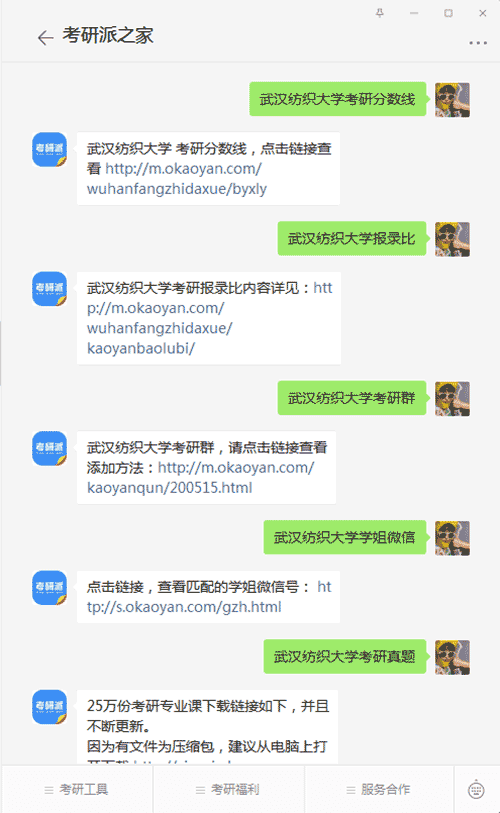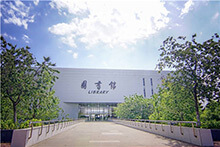武汉纺织大学数学与计算机学院物联网工程专业简介

武汉纺织大学数学与计算机学院物联网工程专业简介内容如下,更多考研资讯请关注我们网站的更新!敬请收藏本站,或下载我们的考研派APP和考研派微信公众号(里面有非常多的免费考研资源可以领取,有各种考研问题,也可直接加我们网站上的研究生学姐微信,全程免费答疑,助各位考研一臂之力,争取早日考上理想中的研究生院校。)
微信,为你答疑,送资源

武汉纺织大学数学与计算机学院物联网工程专业简介 正文
一、专业代码080905I、 Major Code 080905
二、培养目标
本专业面向行业物联网发展战略需求,依托我校25个物联网相关专业的学科优势,突出物联网基础技术在行业领域交叉渗透的应用特点,培养能适应战略性新兴产业发展要求的、知识、能力、品格协调发展的高级工程技术人才。通过专业学习,学生能掌握数学和其他相关的自然科学基础知识、物联网中物互联与信息感知交互的基础理论方法、物联网的关键共性技术和在行业及跨行业领域物联网信息处理应用技术,具有坚实的物联网基础技术在行业领域或跨行业领域综合应用的能力和良好的外语运用能力,能胜任物联网技术的研发及物联网应用系统规划、分析、设计、部署、运行维护等工作的需要。
II、Cultivation Objectives
The speciality is oriented to the need of internet-of-things development strategy in industrial fields, dependent on the discipline advantages of 25-majors related to Internet of things in our university, to highline the application features the basic technologies of Internet-of-things intersect and infiltrate into industrial fields, to cultivate advanced talents of engineering technologies who adapt to the development needs of strategic emerging industries and achieve coordinated development of knowledge, ability, and character. By professional study, the students will be able to master mathematics, basic knowledge related to natural science, basic theory methods about things-to-tings networking and information-sensing exchange, internet-of-things-specific common technologies and application technologies, and to possess the powerful ability to use internet-of-things basic technologies in industrial fields or cross-industrial fields and to use foreign language, and will be able to be engaged in internet-of-things technology development and internet-of-things system’s plan, analysis, design, deployment and operation and maintenance.
三、基本要求及特色
1、基本要求
本专业学生主要学习物联网技术和计算机通信网方面的基础理论、组成原理和设计方法,受到物联网技术实践的基本训练,具备从事行业物联网的设计、开发、调试和工程应用的基本能力,具备较强的创新意识和从事物联网领域科学研究的基本能力。
毕业生应获得以下几方面的知识和能力:
1) 知识要求:具有较宽广的专业知识面,较强的工作适应能力。具有扎实的自然科学基础、较好的人文社会科学基础和外语综合能力;系统地掌握物联网技术领域的基本理论知识,掌握本专业所需的相关学科的基本理论知识;掌握物联网感知与标识的基本理论与技术、物联网信息处理技术;掌握物联网体系结构、数据传输与安全技术
2) 能力要求:获取最新科学技术知识和信息的能力;熟练阅读英文专业科技文献、并运用英语沟通和交流的能力;运用物联网技术辅助物联网规划、设计、计算、控制的能力;了解相关的技术标准和行业应用需求,掌握物联网系统的硬件、软件设计和开发能力,具备在行业物联网系统及其应用方面进行综合研究、集成、开发、调试和管理的能力。
3) 素质要求:具备良好的思想道德修养、健康的心理素质和人文知识素养, 具有较强的自信心、进取心、事业心和社会责任感, 具备敬业精神、团队精神和创新精神
2、专业特色
本专业不涉及传感器技术、RFID技术和M2M执行器的一次开发,而是利用已有物联网基础技术提供的接口和实现的功能,结合各种标准协议的网络接口,从事行业物联网应用要求的设备集成、系统集成、网络集成、软件集成和应用集成,即突出物联网技术的使用和二次开发。
行业物联网应用很多,为突出我校物联网工程专业的特色,将行业物联网应用的两个典型应用:智能玩具(个性化)和工业过程控制(多方整体协作)作为专业的特色定位,前者以全国性智能小车大赛为契机激发学生物联网工程专业学习兴趣,后者结合我校特色学科交叉资源,纺织物联网工程研究中心的研究成果作为教学案例,提升学生物联网工程专业的专业特色优势和就业的核心竞争力。
Ⅲ、 Basic Requirement and Program Features
1. Basic Requirement
The speciality is principally to study the basic theory , constitute principles and designing methods on internet-of-things technologies and computer communication network, receive the basic training on internet-of-things technology practice, to be provided with the basic ability to engage in design, development, testing, and engineering application, to have the more powerful consciousness of innovation, and to prepare for engaging in scientific research in internet-of-things fields.
The graduate should obtain the knowledge and ability in the following aspects:
1) Knowledge requirements: wider professional knowledge range , more powerful Ability to adapt work, the solid foundation of natural science, the basics about humanities and social sciences and foreign-language ability; basic theory knowledge of related disciplines this major needs, basic theory and technologies for internet-of-things sensing and identifying, for internet-of-things information processing; internet-of-things architecture, data transmission, and security technology.
2) capability requirement: to acquire latest knowledge and information about science and technology; to read English scientific and technical literature and to communicate and interact in English; to use internet-of-things technology for assisting internet-of-things plan, design, computation, and control; to learn the needs for related technology standards and industrial application, to master the ability to design and develop the hardware and software of internet-of-things systems, and to have the ability for integrated research, integration, development, testing, and management.
3) quality requirement: good in ideological and moral cultivation, healthy in psychological quality and humanistic knowledge accomplishment, powerful in self-confidence, enterprising spirit, entrepreneur spirit, social responsibility, professional dedication, team spirit, and creative spirit.
2. Program Features
This program is not involved with the first development of sensor technology, RFID technology, and M2M actuator, uses the interface and its implemented function the existing internet-of-things basic technology provides, includes different networking interfaces with standard protocols, engage in device integration, system integration, network integration, software integration, and application integration required from industrial internet-of-things applications, ie., to highlight the use and second development of internet-of-things technologies.
There are so many industrial internet-of-things applications. To highlight the feature of internet-of-things engineering speciality in our university, professional feature positioning focuses on the two typical ones of industrial internet-of-things applications: Intelligent Toys (personalization) and industrial process control (multi-entity cooperation). The former is based on nation-wide smart car contest and inspires student interesting in study of internet-of-things engineering speciality; the latter is combined with inter-disciplinary resource based on special discipline, and takes research results of textile internet-of-things engineering research center as a teaching cases to promote the features and advantages and employment’s core competitiveness for students in internet-of-things engineering speciality.
四、专业准入课程标准
政治理论、高等数学、大学英语、计算机基础、程序设计语言
Ⅳ、 Professional access course standards
Political Theory, Advanced Mathematics, College English, Basic Knowledge of Computer,Programming Language
五、专业准出课程标准
物联网节点技术、物联网通信技术、物联网中间件技术和物联网工程设计与实施。
Ⅴ、Professional out course standards
IOT-node technology, IOT-communication technologies, IOT-middleware technology and The IOT engineering design and implementation.
六、实践性教学环节
数字逻辑课程设计、数据结构课程设计、面向对象课程设计、计算机组成原理课程设计、物联网节点技术课程设计、物联网通信技术课程设计、物联网工程设计课程设计。
Ⅴ、Practical Teaching
Practice courses include speciality experiment courses and speciality practice courses such as Digital Logic, Data Structures, Object-oriented Programming, The Principle of Computer Constructions, Cognitive feedback technology, IOT communication technologies, The IOT engineering design and implementation, and etc.
七、毕业合格标准
本专业学生在校期间必须修满课程教学和实践教学160学分(其中:必修课100.5学分,专业选修课与创新学分32.5学分,实践性教学环节19学分,通识选修课8学分)和素质拓展10学分方能毕业。(其中创新学分与专业选修学分可以互换)
Ⅵ、Graduation Eligibility
Students of this speciality can only be qualified to graduation after the completion of 160 credits, among which 100.5 are compulsory, 32.5 are speciality elective and innovative credits, 19 are courses of practice, 8 elective credits of humanity quality and 10 credits of quality expansion. (Innovative credits and speciality elective credits are interconvertible.)
八、学制与学位
本科四年,授予工学学士学位。
Ⅶ、Length of Schooling and Degree
修业年限: 4年
Duration: 4 years
授予学位:工学学士学位
Degrees conferred: Bachelor of Engineering
武汉纺织大学
添加武汉纺织大学学姐微信,或微信搜索公众号“考研派小站”,关注[考研派小站]微信公众号,在考研派小站微信号输入[武汉纺织大学考研分数线、武汉纺织大学报录比、武汉纺织大学考研群、武汉纺织大学学姐微信、武汉纺织大学考研真题、武汉纺织大学专业目录、武汉纺织大学排名、武汉纺织大学保研、武汉纺织大学公众号、武汉纺织大学研究生招生)]即可在手机上查看相对应武汉纺织大学考研信息或资源。


本文来源:http://www.okaoyan.com/wuhanfangzhidaxue/yanjiushengyuan_310090.html
推荐阅读
-

武汉纺织大学关于开展2022年研究生教学改革与研究项目立项
各学院: 为进一步加强学校研究生教育改革,提高人才培养质量,现启动2022年研究生教学改革与研究项目申报、中期检查及结题工作,具体事宜通知如下: 一、项目申报 1.申报范围 包括但……
日期:01-06 阅读量:24354 -

武汉纺织大学研究生2021—2022学年第2学期课程安排通知
各研究生培养单位: 2021-2022学年第2学期研究生公共课课程表已经确定(见附件1),请根据本单位研究生公共课表安排专业课程的教学。现将相关事项通知如下: 1、各研究生培养单位专业……
日期:12-28 阅读量:24979 -

武汉纺织大学召开研究生教育会议推动研究生教育高质量发
月日,武汉纺织大学在阳光校区国际学术报告厅召开研究生教育会议,贯彻落实习近平总书记对研究生教育的重要指示、全国研究生教育会议和湖北省研究生教育会议精神,分析形势、直面问题,……
日期:12-16 阅读量:24561 -

武汉纺织大学研究生奖学金评定办法
奖助政策我校研究生奖助体系健全,设有国家层面、行业层面、社会层面及学校层面等四大类共余种奖助学金。详情如下表:学校同时实施四鹰计划,符合相关条件者均可申请相应奖助:……
日期:07-29 阅读量:23837 -

武汉纺织大学研究生学费标准
学费标准根据财政部、国家发展改革委、教育部《关于完善研究生教育投入机制的意见》财教号文件要求,我校向所有纳入全国研究生招生计划的新入学研究生收取学费,其中全日制会计硕士学费……
日期:07-29 阅读量:23297 -

2021考研武汉纺织大学拟录取研究生名单公示
近日,研究生拟录取名单已出。考研的同学们有没有关注?今天考研派小编就整理了武汉纺织大学年硕士研究生招生考试拟录取名单的相关内容,希望能对大家有所帮助。点开此链接可查看:……
日期:06-02 阅读量:21830 -

武汉纺织大学考点2020年硕士研究生入学考试地点考场安排
以下是年武汉纺织大学考场安排,点击链接即可查询同学们好,武汉纺织大学考点年硕士研究生入学考试地点考场安排信息如下:特别注意:每个人,尤其是选择异地报考的人,考试期间都要抓紧……
日期:11-19 阅读量:22533 -

武汉工程大学材料科学与工程学院高分子化学与物理硕士专
一级学科领域代码:一级学科领域名称:化学二级学科代码:二级学科名称:高分子化学与物理高分子化学与物理是化学下设的二级学科。高分子化学与物理学科的研究主要涉及高分子材料的合成……
日期:06-01 阅读量:2582 -

武汉工程大学材料科学与工程学院材料科学与工程硕士专业
本专业培养具有较高的外语水平和计算机应用能力,掌握坚实的理论基础和系统的专业知识,具有独立从事工程技术和科研能力,德、智、体全面发展的材料科学与工程方面的高级科学技术人才。……
日期:06-01 阅读量:22036 -

武汉工程大学材料科学与工程学院新能源材料与器件简介
新能源材料与器件学制:四年,学位:工学学士培养目标:本专业培养具备坚实的材料科学及扎实的物理、化学、电子、机械等相关学科基础,具有能够从事新能源材料与器件相关的生产与设计、……
日期:06-01 阅读量:23136 -

武汉工程大学材料科学与工程学院E+材料化学简介
材料化学学制:四年,学位:工学学士文学学士培养目标:本专业旨在培养英语专业基本功和素养扎实,材料化学为发展方向,具有良好的英语综合应用水平,扎实而宽厚的材料化学的专业知识,……
日期:06-01 阅读量:21482 -

武汉工程大学材料科学与工程学院材料化学简介
材料化学学制:四年,学位:工学学士培养目标:材料化学专业旨在培养具备材料科学与化学扎实的基础理论知识与熟练的实验技能,系统掌握功能材料的设计、制备、性能测试及应用等技能,能……
日期:06-01 阅读量:24633 -

武汉工程大学材料科学与工程学院材料物理专业简介
材料物理学制:四年,学位:理学学士。培养目标:本专业旨在培养具有坚实的数理基础、广博的材料学基本知识、系统扎实的材料物理理论及实践技能,同时兼备材料制备、加工、分析测试等基……
日期:06-01 阅读量:21221 -

武汉工程大学材料科学与工程学院无机非金属材料工程简介
无机非金属材料工程学制:年,学位:工学学士培养目标:本专业培养适应国家与湖北经济、社会的发展需求,掌握材料科学与工程及相关学科的基础理论与无机非金属材料工程领域的专业知识,……
日期:06-01 阅读量:23766 -

武汉工程大学材料科学与工程学院高分子材料与工程简介
高分子材料与工程学制年,学位:工学学士培养目标:本专业培养适应区域经济发展需求,掌握系统、扎实的高分子材料与工程领域的基础知识,具有高度的社会责任感和职业道德,良好的人文素……
日期:06-01 阅读量:21086 -

武汉工程大学材料科学与工程学院师资力量
材料科学与工程学院建有一支由知名教授领衔,老、中、青结合的师资队伍,现有专任教师名,其中教授人,副教授人,博士生导师人,硕士生导师名,享受国务院政府特殊津贴专家人,全国优秀……
日期:06-01 阅读量:22080 -

武汉工程大学材料科学与工程学院联系方式
院办电话:院办传真:院长信箱:……
日期:06-01 阅读量:22899 -

武汉工程大学材料科学与工程学院简介
一、学院历史年,由高分子材料与工程教研室(年)、无机非金属材料工程教研室(年)、矿物加工工程教研室(年)和普通物理教研室(年)部分教师组建成立材料工程系;年,更名为材料科学……
日期:06-01 阅读量:24198 -

武汉工程大学土木工程与建筑学院城乡规划专业介绍
城乡规划专业介绍、专业名称、学制、学位城乡规划,五年制本科,工学学士学位、培养目标本专业培养服务于我国城乡建设事业,系统掌握现代城乡规划的理论、原理和方法,了解与城乡规划相……
日期:06-01 阅读量:22737 -

武汉工程大学土木工程与建筑学院建筑学专业介绍简介
建筑学专业介绍、专业名称、学制、学位建筑学,五年制本科,工学学士学位;、培养目标建筑学专业旨在培养拥有自然与人文、技术与艺术相结合的广泛知识背景,具备建筑学独立性学习和批判……
日期:06-01 阅读量:24062



























































